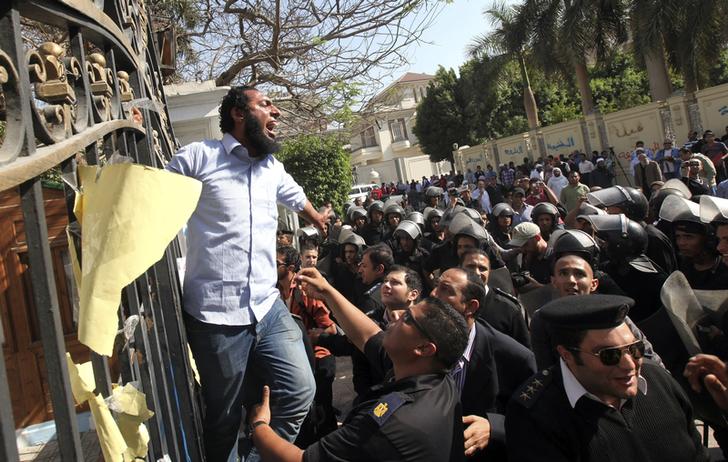Latest NEWS
- Aswat Masriya, the last word
- Roundup of Egypt's press headlines on March 15, 2017
- Roundup of Egypt's press headlines on March 14, 2017
- Former Egyptian President Hosni Mubarak to be released: lawyer
- Roundup of Egypt's press headlines on March 13, 2017
- Egypt's capital set to grow by half a million in 2017
- Egypt's wheat reserves to double with start of harvest -supply min
- Roundup of Egypt's press headlines on March 12, 2017
Egyptian government faces blame in mob sectarian killing

Police tries to remove an Islamist protester, who is chanting slogans, from the fence of the house of the Iranian ambassador during a protest against Iran in Cairo April 5, 2013. REUTERS/Mohamed Abd El Ghany
By Alexander Dziadosz
ZAWIYAT ABU MUSALLEM, Egypt, June 24 (Reuters) - Egypt's government promised "exemplary punishment" on Monday after the mob killing of four Shi'ite Muslims near Cairo raised fears of wider sectarian bloodshed at a time of grave national crisis.
But Shi'ite minority leaders and the liberal opposition accused the government itself, dominated by the Sunni Islamist Muslim Brotherhood, of whipping up sectarian anger over the war in Syria as a means of appeasing its own hardline Salafist allies.
President Mohamed Mursi, under pressure from the army to end broader factional violence, condemned "this heinous crime" and promised "swift justice". Al-Azhar, Cairo's leading Sunni religious establishment, said the killings were contrary to the teachings of Islam and urged "harshest punishment".
In Sunday's violence in the suburb of Zawiyat Abu Musallem, in sight of the Giza pyramids, a crowd ransacked and torched the house of a family, whose members told Reuters the attack began when a Shi'ite dignitary visited them for a religious festival.
They yelled "Infidels!", said one woman who survived and who complained that police failed to intervene during the frenzied violence in the house and rubbish-strewn alley outside. "The Salafis and the Brotherhood - they're the ones who attacked us," added the woman, clearly in shock, sitting in her wrecked home.
A video posted online by rights activists showed dozens of men and youths looking on as several others drag the bloodied body of at least one man along a street, one pulling on what may be a rope around his neck. In other sequences from the events on Sunday, a squad of riot police is present and a group of black-robed women on a crowded, narrow street chant "No God but God!"
Tensions are running high across Egypt between the government and opponents who plan major rallies this weekend to demand Mursi resign. There has been scattered political violence and the army, which effectively ran Egypt for decades before the 2011 revolution, warned it would step in to quell any unrest.
PRIME MINISTER
A government statement issued for Prime Minister Hisham Kandil said he "strongly condemned the terrible incident" and a accused the attackers of importing "sectarian strife" of a kind alien to Egyptian society. He would "ensure justice is done and that the culprits are made examples of by deterrent punishment".
But Mohamed Ghoneim, a leading figure in a Shi'ite community of a few hundred thousand, was quoted by state newspaper website al-Ahram saying the Muslim Brotherhood was trying to appease hardline Salafist allies by not shielding Shi'ites from attack.
Liberal opponents of the Muslim Brotherhood also accused the movement and President Mursi of stirring up sectarian passions by joining this month in Sunni calls for jihad against Syria's president and his Shi'ite allies from Lebanon and Iran.
The opposition Dustour Party said in a statement that it saw "this heinous crime as a direct result ... of the disgusting religious hate speech that goes on escalating with the knowledge of the regime and the blessings of the president".
But Essam el-Erian, deputy leader of the Brotherhood's Freedom and Justice Party, insisted the movement condemned the killings - comparing them to the deaths of its own Islamist allies and supporters in factional clashes in recent days.
"It is forbidden to Muslims to spill Egyptian blood," he wrote on Facebook. "All Egyptian blood - Muslim or Christian, man or woman, Sunni or Shi'ite, civilian or police. Whoever takes part in shedding blood, even in words ... or by hate speech, is taking part in a terrible crime."
He said Egypt would not slip into civil war and that the army stood ready to step in and defend the nation.
Mursi and the Brotherhood angered their Salafist allies by trying to improve ties with Shi'ite Iran since Mursi was elected a year ago. But as the Syrian civil war has inflamed sectarian passions across the Middle East, Mursi and the Brotherhood joined a Sunni conference in Cairo this month that condemned President Bashar al-Assad and his Shi'ite allies.
Mohamed Zarea of the Cairo Institute for Human Rights Studies, said of the mob violence: "This did not just come from incitement by individuals but also the government. After the Syria conference, there was direct incitement against Shi'ites." (Reporting by Maggie Fick, Shaimaa Fayed, Shadia Nasralla and Alastair Macdonald; Writing by Alastair Macdonald; Editing by Mark Heinrich)










